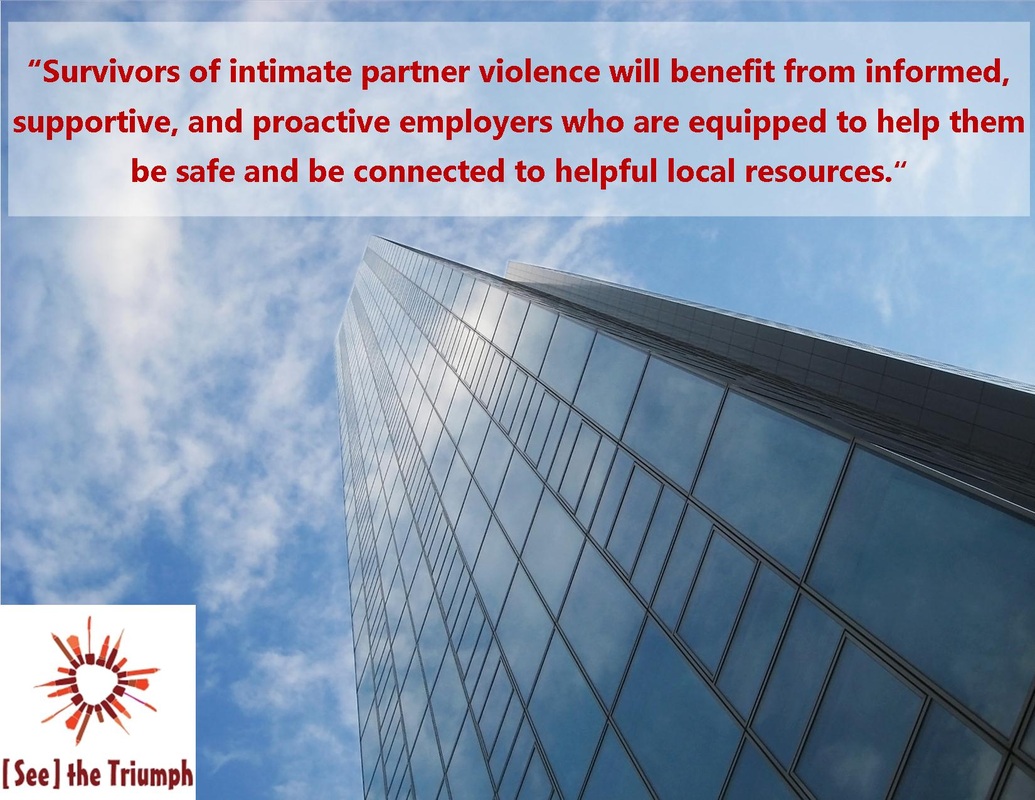|
10/21/2013 Stigma in the WorkplaceBy Christine Murray, See the Triumph Co-Founder
It’s hard for many people to imagine that someone they know personally may be experiencing intimate partner violence, either as a victim or a perpetrator. But the “Women and the Workplace Summit” last week at Florida State University illustrates the importance of people understanding that their co-workers may need help. Margie Menzel covered this event with an article in the Jacksonville Business Journal. The career and economic costs of intimate partner violence are staggering for victims, as well as for businesses and our national economy. Perpetrators, for example, may force victims to miss work or turn over their paychecks immediately so that the victims have no direct access to financial resources. In addition, perpetrators may show up and stalk victims at their workplaces, creating a safety risk and hindering work productivity. All of these factors may make it difficult for victims to maintain employment and advance their careers, and this can create a long-term impact that extends past the time an abusive relationship ends. The economic costs to businesses are substantial. According to the National Coalition Against Domestic Violence, American businesses lose hundreds of billions of dollars each year due to intimate partner violence, not counting the additional billions of dollars that are spent on physical and mental health care. Many people have known someone at their workplace who have experienced intimate partner violence. In one survey by the Corporate Alliance to End Partner Violence (CAEPV), 44% of adults with full-time jobs said that they had seen ways that intimate partner violence impacted their workplace. And yet, the stigma surrounding intimate partner violence can impact how co-workers and businesses respond. For example, Menzel says, “Conference speakers said the first response of employers and colleagues of battered women is often such things as, ‘I have to get my job done --- I don’t want to deal with other people’s personal problem.” She goes on to say that stereotypes that people hold about what types of people are perpetrators and victims also prevent businesses from putting into place policies and resources. Imagine what a powerful message it would send if all businesses ascribed to the first principle of creating safe workplaces, put forth by the National Workplace Resource Center on Domestic Violence: “We will strive to create a workplace environment that is safe from all forms of violence, including domestic violence, and which supports victims of domestic violence to understand and access services, information, and protections available to them.” (p. 4) The full guide, “The Workplace Responds to Domestic Violence,” provides employees and business leaders with valuable steps for promoting safety and responding to intimate partner violence. In addition, the CAEPV provides a useful list of companies that are already taking steps to address intimate partner violence, and the examples provided on that list shows the diversity of creative and helpful approaches that can be used. Survivors of intimate partner violence will benefit from informed, supportive, and proactive employers who are equipped to help them be safe and be connected to helpful local resources. Initiatives to provide this support can begin at any level of an organization ,and the resources provided here can help any employee begin to take action and make the case for their own workplace to address intimate partner violence. Comments are closed.
|
Archives
July 2024
CategoriesAll About Intimate Partner Violence About Intimate Partner Violence Advocacy Ambassadors Children Churches College Campuses Cultural Issues Domestic Violence Awareness Month Financial Recovery How To Help A Friend Human Rights Human-rights Immigrants International Media Overcoming Past Abuse Overcoming-past-abuse Parenting Prevention Resources For Survivors Safe Relationships Following Abuse Schools Selfcare Self-care Sexual Assault Sexuality Social Justice Social-justice Stigma Supporting Survivors Survivor Quotes Survivor-quotes Survivor Stories Teen Dating Violence Trafficking Transformative-approaches |
Search by typing & pressing enter



 RSS Feed
RSS Feed